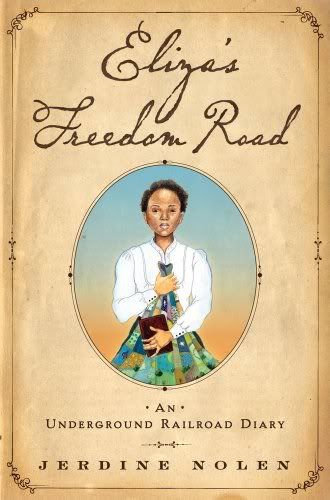by Jerdine Nolan
Simon & Schuster
January 2011
First line, "Dear Reader, I am Eliza. Not the girl, but the grown woman Eliza. It has been many years since I was called Eliza. I call myself Elizabeth now."
12 year-old Eliza lives as a slave in the 1850's in Alexandria, Virginia. As a house slave, she enjoys a comparative number of advantages but still must endure many injustices. She is friends with the house cook, and therefore eats well. Her half-blind mistress has taught her how to read (an unusual advantage for a slave) so that Eliza can read her letters and newspapers. Eliza even has a small diary that she is able to keep. Her mother has sewn her a beautiful quilt, with each quilt square representing a traditional folktale. But Eliza's mother has recently been sent away, and there is talk that Eliza may be sold next. She decides to make a break for it, and the bulk of the story, in diary format, is about her year-long journey northward to Canada by night. Alternating between stories of Eliza's escape and traditionally-inspired folktales, this book reminded me just a little bit of The Wanderer by Sharon Creech.
Eliza is an oddly formal little girl - her tone is a bit stilted, and she never uses contractions, but that may be a reflection of the proper speech of the 1850's. As a "house slave" with a bit of education, she doesn't employ colloquial slave speech. The book culminates in a meeting with the legendary leader of the Underground Railroad, Harriet Tubman. True to history, Tubman is a gruff, no-nonsense figure.
An impressive amount of backmatter helps young readers put everything in perspective. There is an author's note, as well as some information about the background of the folktales within the tale. There's also a bibliography of other resources and a list of websites, which I always think will date a book quickly, but certainly have plenty of use at the moment.
The book wraps up very quickly, with a few amazing coincidences that leave our heroine safely reunited with her mother, who has also escaped by the story's end. I'll recommend this to anyone who has exhausted the Dear America series or for those readers who might appreciate the formal prose that takes you to another century.
12 year-old Eliza lives as a slave in the 1850's in Alexandria, Virginia. As a house slave, she enjoys a comparative number of advantages but still must endure many injustices. She is friends with the house cook, and therefore eats well. Her half-blind mistress has taught her how to read (an unusual advantage for a slave) so that Eliza can read her letters and newspapers. Eliza even has a small diary that she is able to keep. Her mother has sewn her a beautiful quilt, with each quilt square representing a traditional folktale. But Eliza's mother has recently been sent away, and there is talk that Eliza may be sold next. She decides to make a break for it, and the bulk of the story, in diary format, is about her year-long journey northward to Canada by night. Alternating between stories of Eliza's escape and traditionally-inspired folktales, this book reminded me just a little bit of The Wanderer by Sharon Creech.
Eliza is an oddly formal little girl - her tone is a bit stilted, and she never uses contractions, but that may be a reflection of the proper speech of the 1850's. As a "house slave" with a bit of education, she doesn't employ colloquial slave speech. The book culminates in a meeting with the legendary leader of the Underground Railroad, Harriet Tubman. True to history, Tubman is a gruff, no-nonsense figure.
An impressive amount of backmatter helps young readers put everything in perspective. There is an author's note, as well as some information about the background of the folktales within the tale. There's also a bibliography of other resources and a list of websites, which I always think will date a book quickly, but certainly have plenty of use at the moment.
The book wraps up very quickly, with a few amazing coincidences that leave our heroine safely reunited with her mother, who has also escaped by the story's end. I'll recommend this to anyone who has exhausted the Dear America series or for those readers who might appreciate the formal prose that takes you to another century.
Compare to:
The Wanderer - Sharon Creech
I Thought My Soul Would Rise and Fly - Joyce Hansen
A Picture of Freedom - Patricia C. McKissack
I borrowed this book from the library.

No comments:
Post a Comment